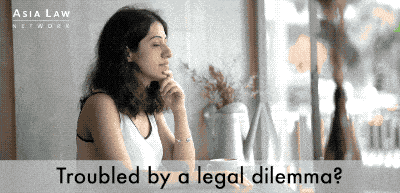To what extent can civilians be involved in prosecuting a perpetrator? In what ways can civilians as individuals bring justice and be involved within the criminal process? Such questions are posed by ordinary people like us, who doubt whether we have a moral responsibility to bring criminals in light of the law. We as civilians need to know where our rights within the law stand. This is extremely important when we face difficult situations of crime where we feel vulnerable and doubtful as to whether we are “allowed” to tackle the perpetrator by ourselves.
What is civilian’s arrest?
In Singapore, civilians can be involved within the first steps of the criminal process through “civilian’s arrest”. Even if there may not be a real offence that has occurred, if the arrestor believes it to be an offence (with good intention), he may bring the individual to police. Yet, the arrest must always be justified, appropriate and reasonable. Private arrest can only be undertaken in three circumstances. First, pursuant to s 66 (1) of the Criminal Procedure Code (“CPC”), a private person can arrest the purported offender if said offender commits an offence that is “arrestable” and “non-bailable.” Both of these conditions must be satisfied in order for the right to arrest the offender to vest in the arresting private person.
Secondly, pursuant to s 66 (1) of the CPC, a private person can arrest any person if the person has been proclaimed as an offender under s 88 of the CPC. Under s 88, if the Court has reason to believe that a person against whom a warrant of arrest has absconded or hiding, the Court may publish a written proclamation requiring said offender to appear at a specified time and place, within 30 days of the publication of the proclamation. Reading s 88 with s 66 (1), it is clear that where a person has been proclaiming as an offender under section 88 – absconder – a private person can effect an arrest on him
Thirdly, pursuant to section 66(6) of the CPC a private person can arrest a purported offender, if said offender commits an offence against the private person or his property.
Section 66 (1):
Under the Criminal Procedure Code (“CPC”), civilian’s arrest is defined under s 66 as “arrest by private person”. This is where any ordinary person may arrest anyone who, in his view or presence, commits an arrestable non-bailable offence, or who has been proclaimed an offender under s 88. Under this provision, there are certain conditions that need to be followed for a civilian’s arrest to be made.
Requirement 1: “In his view or presence”
First, “in his view” has been interpreted as “as long as the private person is in such close proximity that he can be certain that an offence has been committed, the rights vests in him, notwithstanding that he did not actually witness the commission of the offence: Chee Siok Chin v Minister for Home Affairs.
Requirement 2: “Arrestable and non-bailable offence”
Second, the offence for which the offender was being privately arrested for must be an arrestable and non-bailable offence. Both these requirements need to be fulfilled in order for a private person to arrest. An arrestable offence is one for “which a police officer may ordinarily arrest without a warrant.” Conversely, non-arrestable offences are those that are not defined as an “arrestable” offence.
Likewise, the CPC also does not provide a positive definition of a “non-bailable offence” A non-bailable offence is one where the police or court has the discretion to determine whether to offer the accused bail. Section 2 of the CPC does not provide a positive definition of “non-bailable offence,” instead it is defined as all other offences not already defined as a “bailable offence.” This would mean that non-bailable offences are those that are not expressly defined in the CPC or any other written law to be as “bailable.”
A comprehensive list of arrestable and non-bailable offences can be found in the 1st Schedule of the CPC. To find out if an offence is arrestable, see the 3rd Column. If the words “may arrest without a warrant” is used, it is an arrestable offence. If the words “shall not arrest without a warrant” is used, it is a non-arrestable offence. Likewise, to find out if an offence is non-bailable, check the 5th Column.
While, it may seem unrealistic to expect private persons to be aware of the legal definitions of the offences that may have taken place in his view or presence, these requirements are necessary to ensure that the rights of the offenders are protected and that these rights are balanced against the powers of private arrest and the obligations of the apprehenders.
Requirement 3: Handing over of arrested person without unnecessary delay
Further and pursuant to s 66(2) of the CPC, the “private person” (also known as civilian) must hand over the arrested person as soon as possible to the police. This must be without unnecessary delay. The threshold here for determining “without unnecessary delay” is that the handing over of the arrested person must be done as soon as reasonably possible.[1] It does not have to done immediately. It is important to note that although the civilian can physically “arrest” the alleged perpetrator by bringing him to the police, the lawful arrest only happens on inspection by the law enforcement officers.
Section 88
A private person can arrest a person proclaimed as an offender under section 88. A person, against whom an arrest warrant has been issued is believed to be in hiding or has absconded may be proclaimed as an absconder by the Court. The Court may then publish a written proclamation requiring the absconder to appear at a specified time and place.
Section 66(6)
Section 66 (6) allows for a victim of an offence, his employee or a person acting in aid of those victims to arrest the offender if one of the following three conditions is fulfilled:
- The name of residential address of the offender must not be known;
- The residential address of the offender must be outside Singapore;
- There is reason to believe that the name or residential property address the offender has given is false
It is important to note that unlike the power of arrest pursuant to section 66(1) of the CPC, there is no need that the offence committed to be an arrestable, non-bailable one.
What happens after a civilian’s arrest?
As mentioned before, even when an individual is arrested, the police officers must first investigate and then determine the offence to assess whether it is arrestable. For example, for an arrestable offence, the police does not need a warrant for arrest, whereas it is vice versa for non-arrestable offences. Hence, even if a person is arrested by a civilian, the law starts to kick in through the investigation of law enforcement officers.
If an arrestable offence has been committed, the police can arrest the offender spontaneously. However, for non-arrestable offences, the police may have to gather evidence such as the witness reports. Then, they will have to advise the victim to file a Magistrate’s Complaint. A Magistrate’s Complaint can be filed by any person who wishes to seek redress for any offence that they believe has been committed against them. Please refer to this link for more details about how to file a Magistrate’s Complaint.
When the Complaint has been proceeded, the Magistrate will decide the value and worthiness of the case. If that is the situation, a warrant will be issued regarding the supposed offender in order to arrest. Hence, the probability of an individual being lawfully arrested after civilian’s arrest rests on the type of the offence.
To improve the complainant’s case, in other words increase such probabilities, the complainant should ensure that he has acquired any type of evidence (eg. video, recordings, witnesses) which could strengthen his position and could incline the Magistrate to issue a warrant.
A different dimension to civilian’s arrest
Although a civilian’s arrest allows for ordinary people to be involved within the criminal process and is an indirect tool to elevate restorative justice, there are certain issues that the civilian himself might face. For example, if a person arrests someone that he believes is committing an offence, yet the crime did not happen, the person could invite unnecessary lawsuits and criminal charges. For example, the torts of false imprisonment and wrongful arrest.
In certain cases, where private defence is also in the mix, where the individual is trying to protect himself from the alleged criminal, there may also be a problem. The use of excessive force against a criminal could possibly expose the complainant to a charge of criminal assault by the arrested person. This is provided that the force used was not proportionate to the threat.
Is this practice followed in other countries?
Given that this practice is accepted under the British jurisdiction of England and Wales, this practice is also followed in other common law jurisdictions. For example, in Australia, the power to arrest is granted to anyone who is not a police officer. This power is granted by both federal and state legislation under s.3Z of the Crimes Act 1914. Like Singapore, it is important that the arrest be reasonable and appropriate. The arrest must not also be unnecessarily delayed. However, in Mexico, it is different. A non-police officer (an ordinary person) must instead immediately call the police instead of physical arrest. This is because it is illegal to retain any person against their will as it is a deprivation to their liberty.
[1] John Lewis V Tims [1952] AC 676
Have a question or need legal advice?
If you have a legal question regarding legal issues concerning civilian arrest, you can request a quote with Andrew Lee or other lawyers. With Quick Consult, you can check out in minutes and for a transparent, flat fee from S$49, the lawyers will call you back on the phone within 1-2 days to answer your questions and give you legal advice.
This article is written by Andrew Lee from Peter Doraisamy LLC and edited by Saravanan Rathakrishnan from Peter Doraisamy LLC and Meher Malhotra of Asian Law Students’ Association.
This article does not constitute legal advice or a legal opinion on any matter discussed and, accordingly, it should not be relied upon. It should not be regarded as a comprehensive statement of the law and practice in this area. If you require any advice or information, please speak to a practicing lawyer in your jurisdiction. No individual who is a member, partner, shareholder or consultant of, in or to any constituent part of Interstellar Group Pte. Ltd. accepts or assumes responsibility, or has any liability, to any person in respect of this article.

